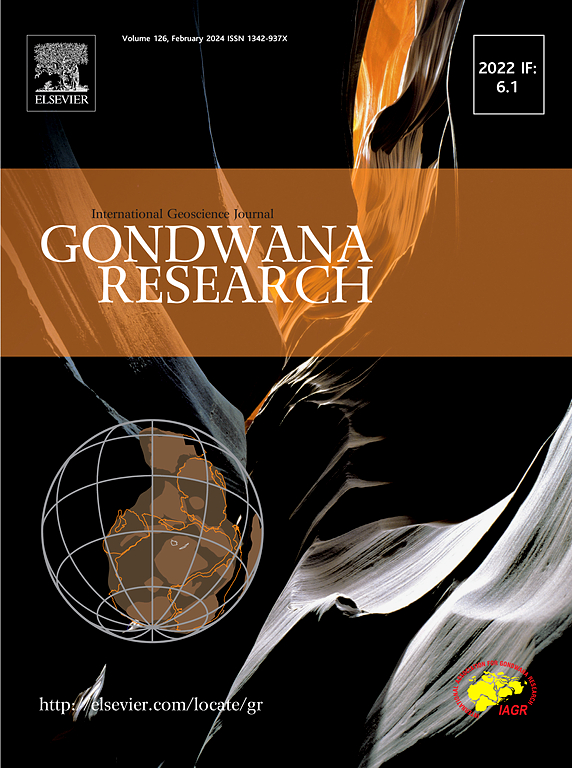Government ecological concern and its impact on synergistic pollution and carbon reduction: Evidence from China
IF 7.2
1区 地球科学
Q1 GEOSCIENCES, MULTIDISCIPLINARY
引用次数: 0
Abstract
This study addresses the increasingly prominent issues stemming from the ongoing degradation of the ecological environment, which pose significant threats to human well-being and have consequently compelled the government to heighten its focus on environmental concerns. With a particular emphasis on the government’s ecological concerns, this study investigates their role in promoting collaborative governance for pollution reduction and carbon mitigation. Employing the fully modified ordinary least squares (FMOLS) and dynamic ordinary least squares (DOLS) methods, this research analyzes the relationship between government ecological concern and the effectiveness of collaborative governance in pollution and carbon reduction. The findings indicate that the government’s ecological concern, economic development, industrial structure, and trade openness can improve the performance of pollution reduction and carbon reduction collaborative governance. Conversely, a negative correlation is observed between urbanization and the effectiveness of such collaborative efforts. Notably, among various categories of government ecological concern, greater attention directed towards environmental pollution, energy consumption, and natural resource management significantly improves the performance of collaborative governance in pollution and carbon reduction. The positive impact of government ecological governance is not consistently sustained; it primarily affects collaborative pollution reduction and carbon mitigation governance at the middle to lower percentiles and exhibits a diminishing effect over time. The causality analysis results of Dumitrescu and Hurlin demonstrate the presence of a reciprocal causal relationship between the government’s ecological concern and pollution reduction and carbon reduction collaborative governance, while there exists a single causal link between economic development, industrial structure, trade opening, urbanization, and pollution reduction and carbon reduction collaborative governance. Drawing on these results, this study presents pertinent policy recommendations to inform and guide pollution reduction and carbon mitigation initiatives, thereby providing valuable insights and references for collaborative governance in this domain.

政府的生态关切及其对协同污染和碳减排的影响:来自中国的证据
生态环境的持续退化对人类福祉构成了重大威胁,因此迫使政府加强对环境问题的关注,这一问题日益突出。本研究特别强调政府的生态关注,探讨其在促进协同治理以减少污染和碳排放方面的作用。本文采用全修正普通最小二乘(FMOLS)和动态普通最小二乘(DOLS)方法,分析了政府生态关注与污染减排协同治理有效性之间的关系。研究结果表明,政府的生态关注、经济发展、产业结构和贸易开放都可以提高污染减排和碳减排协同治理的绩效。相反,城市化与这种合作努力的有效性之间存在负相关关系。值得注意的是,在各类政府生态关注中,对环境污染、能源消耗和自然资源管理的更多关注显著提高了污染和碳减排协同治理的绩效。政府生态治理的积极影响不能持续;它主要影响中低百分位数的协同减少污染和碳减缓治理,并随着时间的推移呈现递减效应。Dumitrescu和Hurlin的因果分析结果表明,政府生态关注与污染减排与碳减排协同治理之间存在反向因果关系,而经济发展、产业结构、贸易开放、城市化与污染减排与碳减排协同治理之间存在单一因果关系。根据这些结果,本研究提出了相关的政策建议,为减少污染和减少碳排放的举措提供信息和指导,从而为该领域的协作治理提供有价值的见解和参考。
本文章由计算机程序翻译,如有差异,请以英文原文为准。
求助全文
约1分钟内获得全文
求助全文
来源期刊

Gondwana Research
地学-地球科学综合
CiteScore
12.90
自引率
6.60%
发文量
298
审稿时长
65 days
期刊介绍:
Gondwana Research (GR) is an International Journal aimed to promote high quality research publications on all topics related to solid Earth, particularly with reference to the origin and evolution of continents, continental assemblies and their resources. GR is an "all earth science" journal with no restrictions on geological time, terrane or theme and covers a wide spectrum of topics in geosciences such as geology, geomorphology, palaeontology, structure, petrology, geochemistry, stable isotopes, geochronology, economic geology, exploration geology, engineering geology, geophysics, and environmental geology among other themes, and provides an appropriate forum to integrate studies from different disciplines and different terrains. In addition to regular articles and thematic issues, the journal invites high profile state-of-the-art reviews on thrust area topics for its column, ''GR FOCUS''. Focus articles include short biographies and photographs of the authors. Short articles (within ten printed pages) for rapid publication reporting important discoveries or innovative models of global interest will be considered under the category ''GR LETTERS''.
 求助内容:
求助内容: 应助结果提醒方式:
应助结果提醒方式:


